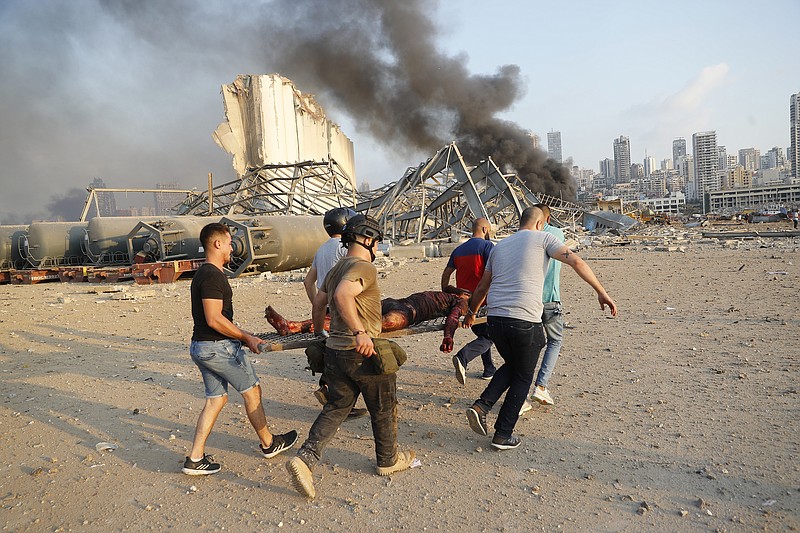BEIRUT (AP) - A massive explosion rocked Beirut on Tuesday, flattening much of the city's port, damaging buildings across the capital and sending a giant mushroom cloud into the sky. More than 70 people were killed and 3,000 injured, with bodies buried in the rubble, officials said.
It was not clear what caused the blast, which struck with the force of a 3.5 magnitude earthquake, according to Germany's geosciences center GFZ, and was heard and felt as far away as Cyprus more than 180 miles across the Mediterranean. Lebanon's interior minister said it appeared a large cache of ammonium nitrate in the port had detonated.
The sudden devastation overwhelmed a country already struggling with the coronavirus pandemic and a severe economic and financial crisis. For hours after the explosion, the most destructive in all of Lebanon's troubled history, ambulances rushed in from around the country to carry away the wounded. Hospitals quickly filled beyond capacity, pleading for blood supplies and generators to keep their lights on.
For blocks around the port, where the explosion took place, bloodied residents staggered through streets lined with overturned cars and littered with rubble from shattered buildings. Windows and doors were blown out miles away, including at the city's only international airport. Army helicopters helped battle fires raging at Beirut's port.
Interior Minister Mohammed Fahmi told a local TV station it appeared the blast was caused by the detonation of more than 2,700 tons of ammonium nitrate that had been stored in a warehouse at the dock ever since it was confiscated from a cargo ship in 2014. Witnesses reported seeing an orange cloud like that which appears when toxic nitrogen dioxide gas is released after an explosion involving nitrates.
Videos showed what appeared to be a fire erupting nearby just before, and local TV stations reported a fireworks warehouse was involved. The fire appeared to spread to a nearby building, triggering the more massive explosion, sending up a mushroom cloud and generating a shock wave.
Charbel Haj, who works at the port, said the blast started as small explosions like firecrackers. Then, he said, he was thrown off his feet.
The explosion came amid ongoing tensions between Israel and the Hezbollah military group on Lebanon's southern border. Many residents reported hearing planes overhead just before the blast, fueling rumors of an attack, though Israeli military overflights are common.
An Israeli government official said Israel "had nothing to do" with the blast. He spoke on condition of anonymity because he was not authorized to discuss the matter with the news media. Israeli officials usually do not comment on "foreign reports." The Israeli government offered emergency assistance through international intermediaries.
The blast was stunning even for a city that has seen a 15-year civil war, suicide bombings, bombardment by Israel and political assassinations.
"It was a real horror show. I haven't seen anything like that since the days of the (civil) war," said Marwan Ramadan, who was about 500 yards from the port and was knocked off his feet by the force of the explosion.
Health Minister Hassan Hamad said the preliminary toll was more than 70 dead and more than 3,000 wounded. He added that hospitals were barely coping and offers of aid were pouring in from Arab states and friends of Lebanon.
Beirut's governor, Marwan Abboud, broke into tears as he toured the site, exclaiming, "Beirut is a devastated city." Prime Minister Hassan Diab vowed "those responsible will pay."
But one of Israel's top bomb experts, Boaz Hayoun, said fireworks could have been a factor setting off the bigger blast. "Before the big explosion in the center of the fire, you can see sparks, you can hear sounds like popcorn and you can hear whistles," said Hayoun, owner of the Tamar Group, which works closely with the Israeli government on safety and certification issues involving explosives. "This is very specific behavior of fireworks."
Some of those injured lay on the ground at the port, Associated Press staff at the scene said. A civil defense official said there were still bodies inside the port, many under debris.
Outside one hospital, Omar Kinno sat on the pavement, holding back tears. Kinno, a Syrian, said one of his sisters was killed when the blast rocked their apartment near the port, and another sister's neck was broken. His injured mother and father were taken to a hospital but he didn't know which, and he was making calls trying to track them down.
"I have no idea what happened to my parents. I am totally lost," he said.
Confusion reigned across the city, as people cleared out of damaged homes or tried to locate family. Motorcyclists picked their way through traffic, carrying the injured.

